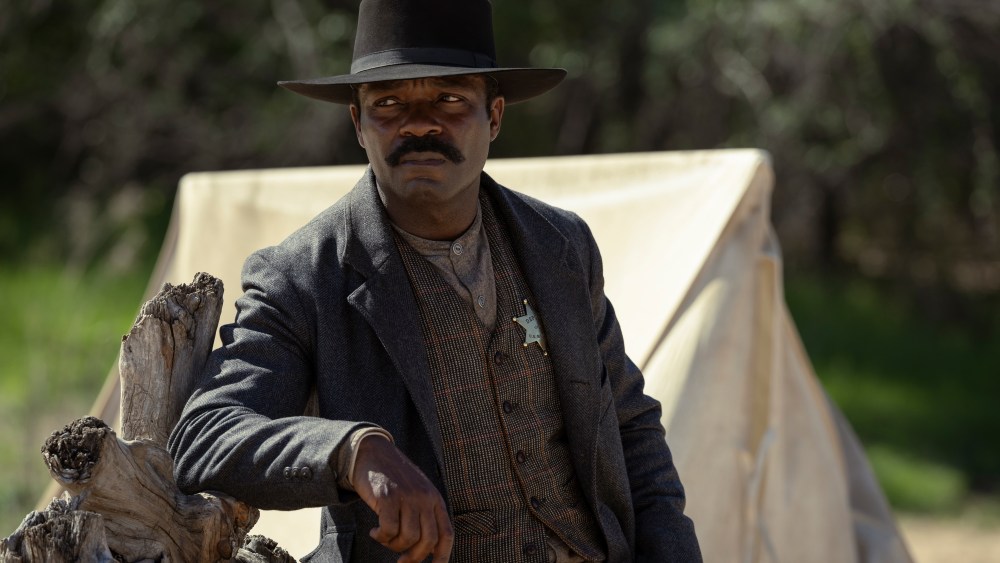“LAWMEN: BASS REEVES”; series review
The television Western genre is long past its heyday. In the fifties and sixties, TV was filled with exciting “Oaters” that glued viewers to their sets and had young kids dreaming to be one of the real-life heroes who fought bad guys with grit, smarts and a six-shooter. While shows like “The Life and Times of Wyatt Earp,” “Have Gun Will Travel” and especially “Gunsmoke” would be hard-pressed to find an audience in today’s television landscape, Paramount’s excellent new series, “Lawmen: Bass Reeves,” takes its true tale seriously, but allows viewers some cowboy shoot ’em up moments. Executive-produced by the prolific Taylor Sheridan, the eight-episode series is a well-done Western that tells the life of a former slave who became this country’s first Black sheriff.
Evident in his Oscar-nominated screenplay for the film “Hell or High Water” and his hit series “Yellowstone,” Sheridan knows and loves the cowboy world. While his first full-on Westerns came in the form of his two “Yellowstone” prequels (the incredibly dull “1883” and the much better “1923”), it is in “Lawmen: Bass Reeves” where the productive filmmaker finds a more fertile ground as producer.
Developed by Chad Feehan, the story of the legendary Bass Reeves has long deserved a project that knows how to tell his tale. There have been a few awful straight-to-video cheapies that cashed in on the name, the less said about them, the better. David Gyasi starred as reeves in the underwhelming AMC series “Hell on the Border”. Coleman Domingo played him in an episode of the ridiculous NBC series “Timeless. HBO’s “Watchmen” miniseries began with a short about him, and Delroy Lindo played the lawman in the exciting 2021 film “The Harder They Fall.” Only when Feehan and Sheridan came along with their combined understanding of the importance of his legacy, did Reeves’s incredible life find the proper retelling.
A slave in Arkansas, Bass Reeves (a never-better David Oyelowo) was forced to fight for the Confederacy during the Civil War. The man who enslaved him (a wonderfully detestable Shea Wigham) promises to free Reeves if he can beat him in a card game. Things go badly, and Bass becomes a runaway, leaving behind Jennie (Lauren E. Banks), the woman he loves. Living some years in the Indian territory, Reeves survives with a Native American family, taken in by Sara (Margot Bingham), a Seminole woman whose husband was killed in the war, and her son, Curtis (Riley Looc). Both the end of the Civil War and a reunion with Jennie will set him on the path to farming and family life until destiny rides up in the form of Dennis Quaid’s Sherrill Lynn, a United States Marshal who hires Reeves as a “posse man”, to help hunt down a fugitive. Impressed by his “sand”, territorial Judge Issac Parker (Donald Sutherland) sends Lynn to offer Reeves the official job of Deputy Marshal, setting him on his course to history as the first Black man west of the Mississippi to wear the badge.
An actor who is sometimes too intense when he should be more relaxed, David Oyelowo gives the performance of his career, as Bass Reeves allows him an intensely human character that speaks to his strengths. Reeves is persistent and focused, even in the most dangerous of situations. Bass Reeves is, as Quaid’s Marshal Lynn puts it, “the most earnest man I ever met.” Oyelowo inhabits all of this man’s grit and determination, traveling the many emotions of Reeves’ epic life. The lawman was very spiritual, always carrying “The Good Book” with him. The duality of living a life that serves God while existing in such a violent land (represented by the bullet hole in Reeves’ bible) is well-drawn in the actor’s work here. Oyelowo is steadfast and stern while effortlessly hitting the emotions of a husband and father who wants to live a good life, missing his family every moment he is away.
As written (by creator Feehan and his team of seven fellow writers), the series is rich in character. It has been some time since Dennis Quaid has been in the saddle or had a role as good as Marshal Sherrill Lynn. The actor uses his devilishly intoxicating charm to show a man who walks an uneven balance of bigotry and being a dutiful lawman. Marshall Lynn is a brutal man with an inner rage, yet Quaid finds the humanity within him, keeping the character authentic.
Lauren E. Banks has an incredible screen presence as Jennie. The performance is strong and shows the backbone and determination of a Black woman living in the post-Civil War 1800s. Jennie is as graceful as she is unwavering. Banks’ work follows suit.
Sutherland, Wigham, Barry Pepper, Forrest Goodluck, Lonnie Chavis, Demi Singleton, and Garrett Hedlund all craft fine supporting performances that give expanded life to the project and the people who inhabited the world of Bass Reeves.
Based on Sidney Thompson’s trilogy of historical novels (“Follow the Doves,” “Hell on the Border,” and “The Forsaken and the Dead”), “Lawmen: Bass Reeves” is to be the beginning of a proposed anthology series focusing on the Marshals, Sheriffs, and other real-life badge-wearing figures who helped tame the American West.
With the series’ gritty and realistic look (courtesy of cinematographers Christina Alexander Voros and Dino Parks), literate script, great cast, and patient direction, “Lawmen: Bass Reeves” is a gift for those who appreciate an excellent Western well-told. Let us hope enough viewers will give it the ratings to warrant the series a long life.
Now available on Paramount+
news via inbox
Nulla turp dis cursus. Integer liberos euismod pretium faucibua



